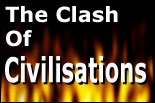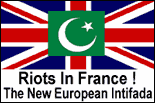|
|
|||||||||||||||||||||||||||||||||||||||||||||||||
Britain is lucky enough not to actually border on a Muslim country. Serbia, on the other hand, borders on Muslim Albania, which is trying to take over its province of Kosovo, cradle of the historic Serbian nation. Serbia has fought for centuries against Muslim penetration into Europe, by means of the Turkish Ottoman Empire and otherwise. Allowing the UN to dismember Serbia would be a violation of the UN Charter and a terrible precedent for Ulster. The so-called Kosovo Liberation Army is a gang of Islamist narco-terrorists that have been adopted as pets by the UN as a sledgehammer against an unsubdued European nation that refuses to surrender to globalism. http://www.serbianna.com/columns/joksimovich/005.shtml In March 2007 it will be eight years since the Kosovo war and the US-led NATO intervention in gross violation of a host of international laws including the UN Charter. The Western part of the international community was determined to resolve the Kosovo status issue by the end of 2006. However, the UN Kosovo mediator, former Finnish president Martti Ahtisaari, has delayed his proposal until after the Serbian parliamentary elections on January 21, 2007 in order to reinforce the democratic camp within Serbia. There were other important considerations such as sharp divisions within the Contact Group (US, UK, Germany, France, Italy and Russia), the veto holding members of the UN Security Council (US, UK, France, Russia and China) and the 27 member European Union (EU). The issue can be straightforwardly resolved by staying within the bounds of the international law and the UN charter which guarantees the inviolability of borders of all internationally recognized states, their sovereignty and territorial integrity. A compromise cannot be found unless the seven-year quest by some Western powers, notably the US and the UK, for conditional independence is not dropped. Nonetheless, according to numerous media reports Ahtisaari proposal is likely to advocate some kind of a conditional independence despite the threat of a Russian veto in the UNSC. Adherence to the international law is not only in the interest of stability in the Balkans and thus of Europe but it is in the US interest as well as other Western powers. German chancellor, Angela Merkel, has stated that “Serbia is most important country in the region. Without a stable Serbia there will be no peace there.” The Serbian province of Kosovo and Metohija, Kosmet in Serbian but for brevity reduced to Kosovo in this essay, provides identity to the Serbian nation, a cradle of the Serbian civilization. The international media ignores the province of Metohija in order to negate 800 years old existence of the Serbian Orthodox Church. The term Metohija derives from the Greek word Metox, which refers to lands set aside for the use of the Church. The Albanians see Kosmet as a part of Greater Albania or alternatively ethnically pure sovereign state. To Albanian mafia it is a safe haven for their criminal operations. To Al Qaeda it is another Balkan terrorist hub. To the Islamists it is a part of recycled Balkan caliphate. To the U.S. and Germany it has provided an opportunity to exploit the Serb-Albanian conflict in order to strengthen their respective geostrategic positions in the Balkans. President Clinton often stated that he went to war to defend “poor Muslims.” Mike Jackson, NATO top commander in Kosovo who recently retired as Chief of the General Staff in the British Army, said: “Of course when we come to Kosovo in 1999, the West’s intervention was almost entirely predicated on the protection of a Muslim population.” The NATO bombing campaign did not result in an unconditional surrender, because of the determination of the Serbian people to defend its territory, but in a negotiated settlement reflected in UN Security Council (UNSC) Resolution #1244. The resolution established Kosovo as a UN protectorate and created the UN Interim Administration Mission in Kosovo (UNMIK) on an indefinite basis. Maintaining a secure environment has been assigned to NATO’s multinational force called KFOR (Kosovo Force). Russia and China opposed rewarding the Kosovo Albanians with independence fearing that the Western powers could use the Kosovo precedent to weaken their own countries by various Muslim separatist movements inside their countries. Hence, the political status was left unresolved. In the resolution the terms “substantial autonomy” and the sovereignty of Yugoslavia (now Serbia) are each mentioned three times. The terms “self-determination” and “independence” are not mentioned once. The essence of the mission boiled down to a promise made on numerous occasions: to transform Kosovo into a society in which all citizens could live in security and dignity. The mission failed from the very beginning due to rivalry for political power within Kosovo. The Albanian Kosovo Liberation Army (KLA) thugs established civil authorities in 27 out of 29 municipalities before the UNMIK team arrived with only eight people. The Kosovo Serbs and other minorities, Roma in particular, were exposed to national, cultural and spiritual genocide. The state of lawlessness only subsided when apartheid was achieved through intimidation and harassment driving the Serbs and others minorities to cluster in ethnic enclaves. In 2002 UNMIK established eight Human Rights Standards for a behavior of Kosovo Albanians such as sustainable returns of those ethnically cleansed, freedom of movement, functioning of democratic institutions, establishment of rule of law, etc. These standards represented the essential elements of a stable society. The world was told how these standards would have to be met before any talks on the Status could be initiated, i.e. Standards before Status. UNMIK dismally failed in implementing these standards as exemplified with a number of Serb and Roma returnees. UNMIK established a Kosovo Privatization Agency which basically confiscated all state owned property and declared that the companies have neither ownership nor control over it despite the fact that Serbia invested over $17 billion since 1970 through underdevelopment fund derived from taxing ordinary Serbs. In addition, the KLA appropriated numerous properties with UNMIK not wanting to “rock the boat.” Russell Gordon, an American journalist, reported recently from Kosovo: “Life for a Serb in Kosovo today is terrifying, expecting to be attacked, even waiting to die. One hopes at best one will be allowed to flee alive. Even Serbian children are not safe as the Albanian school teachers in some villages are letting the small children out of school to stone Serb UN bus. The Albanians indoctrinate their children from a young age to hate.” Rada Trajkovic, member of the Serb National Council in Kosovo, on the occasion of the International Human Rights Day, stated: “The only reality is kidnappings ,murders, denial of freedom of movement, daily plantings of explosive devices on roads used by Serbs, trading in white slaves and children....Serbs who are completely denied their rights live in Kosovo with the hope that the civilized world will help them but also with fear that the next International Human Rights Day will be even worse, and that there will be much fewer of us then there are today.” Iain King and Whit Mason, who served with UNMIK for years and authored Peace at Any Price: How the World Failed Kosovo, said in the book: “International pusillanimity did not honor local mores—it benefited a small minority of self-styled militants and outright criminals who live by extortion.” Kosovo became the black hole of Europe as the organized crime, drug and human trafficking center. Five years into the mission, the international community started looking for a way out. The process was slow downed by the March 2004 Kosovo pogrom in which about 60,000 strong Albanian mobs in an orchestrated fashion attempted to implement a prearranged ethnic cleansing plan. In 33 violent incidents, aimed at ethnically cleansing Central Kosovo from the Serbs, the mob clashed with KFOR, UN and local policemen. There were 21 deaths and some 900 injuries. 4,500 Serbs were driven from their homes. 35 Serbian churches were burned or badly damaged and often sprayed with KLA graffiti. KFOR/UNMIK was slammed by the human rights organizations, but the chief instigators were not found. A paper produced by the OSCE listed ten underlying factors that had created the conditions for violence. One of them is the perception of unconditional support from the U.S. While the OSCE report says “despite American’s diplomat’s best efforts to correct this delusion,” this writer believes that the Albanian perception is essentially correct. Who else would have allowed once declared terrorists and war criminals to become statesmen and even the prime ministers! Despite the pogrom and the fact that Standards were nowhere close to being met, the UNSC on October 24, 2005 endorsed Kai Eide (Norwegian diplomat) report and backed the proposal to open talks on the future of Kosovo. This represents the best evidence that UNMIK was not serious enough about implementing the standards, it amounted to nothing more than rhetoric. Former Finnish president, Martti Ahtisaari, was appointed as the UN Special Envoy. As discussed below Ahtisaari was a wrong man for the job assuming sustainable stability in the region was the overriding top objective? Eide acknowledged that the inter-ethnic relations remained bad, “biggest threat to the future of Kosovo...Little has been achieved to create foundation of a multiethnic society...Property rights are neither respected nor insured...Illegal construction and occupation of homes is a widespread phenomenon.” It became obvious to an unbiased observer that elections, institutions, laws passed during the UNMIK rule cannot secure democracy unless the rule of Albanian thugs is seriously confronted. However, there was no willingness in the West to do so. The risk aversion culture dominated. The instruction from the New York headquarters to UNMIK was “do not rock the boat.” The international community in the form of a Contact Group established the set of principles: (a) No partition of Kosovo; (b) No return to the situation before March 1999; (c) No union of Kosovo with neighboring states; (d) Protection of minorities; (e) Decentralization. The principles seemed to have been designed to strongly favor the independence option, in violation of UNSC #1244, before any serious negotiations took place. Arguments were made that harsh realities on the ground make Kosovo independence the only viable option, that independence is the only pragmatic solution, etc. The Contact Group made a fundamental mistake at their January 31 meeting in London when they declared that the final solution must be in line with the will of people in Kosovo. What about the will of the people of Serbia, the people in whose state Kosovo is? This would have been a legally defensible position. Reflecting this guidance a senior British diplomat, John Sawers, told Belgrade shortly thereafter that the West has “decided” Kosovo should be independent. Independence would mean that Albania would have two states. Didn’t the Albanians exercise their right of self-determination by forming Albania in 1913? Now they are supposed to form another Albanian state on the Serbian territory almost a century later! This precedent would have destroyed the principles on which the international law and the European order have been based on without even scheduling an international conference to amend the 1975 Helsinki Final Act which was accepted by the U.S. and the EU. The criterion of no partition is also a strange one since Kosovo historically has not been a distinct territorial unit with established borders. In 1946 the Yugoslav communists arbitrarily established Kosovo borders, as an autonomous province within Serbia. In the Kingdom of Yugoslavia Kosovo did not exist even as an entity. Moreover, what sense does it make to say that Kosovo, unlike Serbia proper, cannot be broken up? A sound legal rationale for independence does not exist. The most frequently parroted argument has been that the Albanians constitute 90% of the Kosovo population. This argument, however, has no legal standing as the international law does not recognize the right of self-determination in the form of secession of an administrative unit. In addition to the Helsinki Final Act, which prohibits secession, the EU, in the principal statement of its Badinter Committee, follows the Montevideo Convention in its definition of a state: by having a territory, a population, and a political authority. Obviously, the Kosovo Albanians do not satisfy these criteria. The Albanians are a majority in Kosovo but a minority within Serbia. They became a majority after the Yugoslav communists in 1945, upon conclusion of the WWII, issued a ban on return of Serbs---Resolution #343 in preparation for Tito’s ambition to establish a federation with Albania which did not materialize due to rift with Stalin in 1948. The Serbs in the Yugoslav Republic of Croatia were a majority in Srpska Krajina but a minority within Croatia. The Republika Srpska Krajina (RSK) was not internationally recognized by the Badinter Commission because it would have violated the international borders after the ruling on November 29, 1991 that Yugoslav republic borders become international borders. Ruling on January 11, 1992 did not favor Kosovo independence. It is also relevant that the Serbs in Kosovo have been subjected to ethnic cleansing for five centuries during the Ottoman Empire, Austro-Hungarian Empire, Mussolini/Hitler rule, communist dictator Tito rule and lastly during the UNMIK protectorate when about 230,000 Serbs were ethnically cleansed. There are many other parts of the world in which various minorities have overwhelming regional population advantage. In the southwestern Chinese Xinjiang province (17% of China) less than 1% is Chinese while 99% are Muslim Ughyurs. Kashmir has a 90% Muslim majority with a 10% Hindu Pandits. In Ahtisaari home country, Aland Islands belong to Finland despite the fact that the Swedes constitute the majority. Former Canadian Ambassador to Yugoslavia Joe Bissett stated: “There is no majority in the world which deserves independence less than Kosovo Albanians.” Another argument advanced by the Soros mostly funded International Crisis Group (ICG), the Clinton administration stars like Holbrooke and Albright and other Albanian lobbyists has been that the Serbs were disqualified from retaining territorial integrity over Kosovo because of the Milosevic rule. Ahtisaari served as the Chairman of the ICG. Several other leading Serb bashers serve or served on the Board. In this argument the millennium old history apparently starts and ends with Milosevic. Nothing happened before or afterwards. It should be noted that Ahtisaari, after negotiating termination of the Kosovo war, predicted in 1999 that Serbia would lose Kosovo unless it became a democratic state. The fact that the Serbs removed Milosevic from power in a 2000 bloodless coup and established a democracy doesn’t seem to count! Even during Milosevic’s rule the fairy tale propaganda stories are used instead of hard facts. As an example, Milosevic allegedly ethnically cleansed and deported Albanians. During the vicious fighting between the KLA insurrection from Albania, supported by the Islamist world, including Al Qaeda and Iran, as well as by the Western intelligence agencies, there were some 2000 fatalities on both sides but mainly between the KLA fighters and the Serbian police. There were displacements of civilians within Kosovo but that applies to the total population not only to Albanians. The claim that Milosevic deported some 800,000 Albanians into Macedonia and Albania is nothing short of absurd. Scores of witnesses testified in The Hague, including a British journalist on the ground, that the Albanians were by and large running away from NATO bombs as well as being ordered by the KLA to leave their homes for Macedonia and Albania. What about the thousands of Albanians that fled to Serbia proper? About 800,000 Lebanese civilians were uprooted from their homes during the 34-day Israeli-Hezbollah war. Were they deported too? Albanian terrorism in Kosovo dates back to 1912 when the Serbian troops liberated Kosovo from the Ottoman Empire. During WWII, the Albanian Balli Kombetar and the 21st Waffen SS Division Skanderbeg committed merciless persecution of Serbs killing 10-20,000 and ethically cleansing 100-120,000. Massive colonization of Albanians into Kosovo took place, which continued during the communist dictatorship. Under the 1974 Yugoslav constitution the Kosovo Albanians were granted unprecedented autonomy. They only had formal links to Serbia but no right of self-determination. Albanian professor, Dr. Hajredin Hodxa, stated: “I have visited more than 60 countries and I have attended the most important conferences on these problems held in different parts of the world. I have come to irrefutable conclusion that not a single national minority in the world has achieved the rights that the Albanian nationality enjoys in Socialist Yugoslavia. The Albanian nationality exercises rights equal to those of other nations.” Despite this riots erupted in 1981 with the Albanians demanding a republic with the Leninist right of self determination: including annexation to Albania. It should be noted that the Western powers supported Milosevic in the timeframe 1995-1997. President Clinton and ambassador Holbrooke in particular build him up as a peacemaker without whom the Dayton Accords wouldn’t have been possible. After Milosevic stole the municipal elections from a coalition of Serbian democratic parties, and a 90-day winter 1996-1997 street demonstrations, the Western powers bailed him out and enabled him to stay in power. Hence, it could be argued that whatever he might have done since 1997 the West must accept responsibility. Some Western policy makers, such as Undersecretary of State Nicholas Burns, argue that the process of dissolving Yugoslavia is a unique event supervised by the UN and carried out with democratic safeguards. Kosovo as a ward of UN cannot be compared with unrecognized breakaway regions. Russian president Vladimir Putin gave weight to the Kosovo precedent idea on Russian TV on January 30th: “We need universal principles to find a fair solution to these problems. If people believe that Kosovo can be granted full independence, why then should we deny it to Abkhazia and South Ossetia? What is the difference?” Russia has backed these pro-Moscow separatist enclaves in the post-Soviet region but has so far been deterred from granting recognition because of long-established principle of inviolability of borders. Kosovo independence precedent could open yet another Pandora’s Box in addition to Iraq. It would threaten to destabilize many corners of the world as it would encourage secessionist movements in Azerbaijan (Nagorno-Karabakh), Canada (Quebec), China (Taiwan, Tibet, Xinjiang), Cyprus (Turkish Republic), France (Corsica), Georgia (Abkhazia, South Ossetia), India (Kashmir), Indonesia (Papua, Aceh), Ireland (Northern Island), Italy (Sardinia), Moldova (Transniestria), Turkey/Iraq/Iran (Kurdistan), Philippines (Mindanao), Rumania (Transylvania), Spain (Basque Country, Catalonia), Sri Lanka (Tamil), Sudan (Southern Sudan), etc. Like Kosovo most of these statelets would not be economically viable and like tiny newly independent state of East Timor could be mired in ethnic violence. Lastly there could be consequences within former Yugoslavia itself, i.e. independent Republika Srpska in Bosnia and eventual merger into Serbia, Croatian Herzegovina in Bosnia, Serbian Krajina in Croatia, Albanians in Southern Serbia could demand annexation to Kosovo, Albanians in Western Macedonia, already called Illyrida, wouldn’t be spared, the virus might infect Albanians in Montenegro and Greece. Creation of micro-nationalist statelets ultimately could boost the UN membership to some 400 countries and in the process causing many perpetual wars. There are 5,000 different ethnic groups in 200 countries. Lack of valid arguments was substituted with a huge well financed, politically motivated, a pro-Albanian bias on the part of a political elite on both sides of the Atlantic. As stated above appeasement of radical Islam appears to be a principal component of this policy. There are perhaps others which are outside the scope of this paper. It should be remembered why Clinton went to war as stated above. Clinton’s appeasement of radical Islam was a prominent feature of his foreign policies. In my book, The Revenge of the Prophet: How Clinton and His Predecessors Empowered Radical Islam, I have made an assertion that these policies led to 9/11. A part of these political elite is Senator Biden who has now become the Chairman of the Senate Foreign Relations Committee who stated that “Pristina is one of rare Muslim cities in the world where the US is not only respected but adored.” Pristina is some kind of an island in the Muslim Sea. Before the war 40,000 Serbs lived in Pristina; that number has been reduced to about 100. In a recent interview with the Financial Times, Senator Biden lamented how Serbia and Russia are conspiring to seize defeat from the jaws of victory. For him Kosovo independence is a “victory for Muslim democracy, a better future for South-East Europe and validation of for the judicious use of American power...The people of Kosovo--already the most pro-American in the Islamic world—will provide a much-needed example of a successful US-Muslim partnership.” There is an abundance of evidence to prove that for the Islamists Kosovo is a jihad. In 1992 the Organization of Islamic Conference (OIC), which Albania joined the same year, demanded independence for Kosovo. Osama bin Laden established a base in Albania in 1994. He invested $11.4 million in the Arabic-Albanian bank. In 1997/98 he armed and infiltrated the KLA. Hundreds of mujahideen joined the KLA. After the 1998 US embassy bombings in Kenya and Tanzania and 9/11 in particular the US was successful in neutralizing Al Qaeda cells in Albania but the Islamist interest is currently concentrated in Kosovo. As a matter of fact Kosovo is currently a White Al Qaeda training center... Recently Western intelligence officers provided Defense & Foreign Affairs with documentation, including NATO maps of 16 terrorist and combat training camps and depots, plus a network of safe houses and support locales. A terrorist attack discussed in my book on the Bondsteel American base was fortunately averted. Explosives for the Madrid and London bombings came from Kosovo. Eradication of Christianity has taken place. 150 Serbian churches have been demolished while some 400 mosques have been built. Saudi flag is flying on some of them. In his most recent book Pakistani President, a moderate Muslim and a key U.S. ally in the war on terror, suggests that the British MI-6 had recruited Omar Sheikh, murderer of the Wall Street journalist Daniel Pearl, and sent him to Kosovo to join the jihad. There is little doubt that the Islamists will declare a victory for jihad if Kosovo becomes independent. UN brokered talks opened in Vienna in February 2006. After eight sessions Austrian diplomat, Albert Rohan, acting as Ahtisaari deputy announced in mid-September: “We’re approaching a moment where by talking alone we won’t accomplish the goal. We could talk for another 10 years and not change anything.” Rohan said that the two sides deadlocked over how many municipalities should be set up to give Serbs influence in day-to-day affairs in areas where they form a local majority. The Albanians declared that the talks ended and threatened violence in the event the independence decision is delayed. Ahtisaari, who attended only one session, briefed the UNSC that possibilities for negotiations between Belgrade and Pristina have been exhausted. Dr. Sanda Raskovic-Ivic, head of the Coordination Center for Kosovo and Metohija, reminded the Council that between October 25, 2005 and September 1, 2006 there were 260 ethnic incidents. She concluded: “Albanians without Serbs cannot do too much and therefore they should not lightly reject the reasonable and generous offers coming from our side of the table. In spite of the evident difficulties, there still exists maneuver space for an agreement, based on democratic principles and European standards.” During Vienna talks on August 8, Ahtisaari told the Belgrade negotiators that Serbia must take into account the legacy of Milosevic’s regime: “Serbs are guilty as people.” With this statement Ahtisaari joined the advocates of the darkest ideas in the history of mankind on the collective responsibility of entire nations. This is one of the axioms of fascism. Even after all Nazi horrors in WWII, including the holocaust, the Germans were not deemed guilty as people. This was a perfect timing for resignation. While it should be reasonable to postulate that Ahtisaari has been entrusted with the UN mandate of enabling negotiations in order to achieve a compromise, a historical just solution based on the principles of international law it is not how he interpreted the mandate. On several occasions he has advised that compromise and negotiations are superfluous because a solution already exists that needs only to be implemented and that is independent Kosovo. This led former U.S. ambassador to Belgrade, William Montgomery, to state that the talks for Kosovo future status that are held in Vienna are a “farce directed by the international community.” Ahtisaari apparently was led to believe that Serbia, under huge Western, mostly Anglo-American, pressure would give up 15% of its territory for some foggy promises of membership in NATO and the EU. In other words the negotiations were designed to fail in a similar manner like so called February 1999 Rambouillet Conference was not a peace conference but a setup for the war. Independence would be imposed through isolation putting Serbia in a Belarus type of isolation. Holbrooke and other Serb bashers had publicly threatened that Serbia had a choice of either becoming a NATO and an EU member or facing Belarus type of isolation. According to a number of media reports, Rumania and Bulgaria which have joined the EU on January 1 caught “the last train” before the EU shuts its door to future applicants at least for a long while. The EU is not even willing to talk about the schedules to applicants from Western Balkans like Serbia any longer. In the circumstances Kosovo Albanian leaders behaved as if the negotiating process was intended to be nothing but pro-forma and simply beginning of a dialogue for preparation of independent Kosovo. In his final appearance prior to his death, in December 2005, Ibrahim Rugova said: “We did not achieve independence (in 2005), but we will have it in 2006.” On the other hand Serbia adopted a European solution for Kosovo: Respect for the UN Charter and fundamental principles of international law going back to the Treaty of Westphalia of 1648. The treaty’s foundation was the doctrine of sovereignty, which declared a state’s domestic conduct and institutions to be beyond the reach of other states. This doctrine was codified in the 1975 Helsinki Final Act regarding inviolability of international borders. It clearly leads to the position that Kosovo could never become independent in a legal and just way but it could “only be seized” by legal violence based on force. Serbia wouldn’t accept a declaration of another Albanian state on its own territory no matter what the reward or punishment may be. As the Serbian Prime Minister Kostunica said for Serbia the Kosovo status issue was resolved at the Serbian referendum when the Constitution declaring the province an inalienable part of Serbia was confirmed. Incidentally Ahtisaari refuses to condemn Albanian terrorist acts. During this writing Albanian terrorists dynamited the Zvecan-Kosovo Polje railway tracts, the railway used by the Serbs. In addition, the Albanians stoned busloads of Serbs in the Strpce municipality. These types of terrorist acts are reported by mainstream media but Ahtisaari chooses to ignore them. The Serbian Prime Minister, Vojislav Kostunica, has requested a response to the question why Ahtisaari has never condemned terrorism by Albanian separatists in accordance with his mandate and responsibilities. “We must know what it is that is preventing Ahtisaari from carrying out his responsibilities.” Ahtisaari presumably was assured that opposition from Russia would be somehow removed. Ambassador Montgomery suggests that the Western international community has relied on two key outdated assumptions: 1. Pressure and deception would finally convince Russia to yield in the UNSC. If this fails then the UNSC could be bypassed and individual countries would recognize independent Kosovo. The assumptions were valid for the Yeltsin era when Russia was weak. Russia is now an energy superpower which has defined own foreign policies. 2. Serbia would so badly want to integrate into the Euro-Atlantic institutions, like its neighbors did, that it would be willing to give up Kosovo. In 2001 and thereabout that assumption was valid. However various Western blackmails related to the Hague Tribunal in particular and lack of economic progress discouraged and frustrated the Serbian population and resulted in apathy and support for the Radical Party with a nationalist agenda. While in Washington in the summer of 2006 this writer was told that the U.S. would buy the Russian and Chinese votes in the UNSC by offering those favors elsewhere in the world. It is conceivable that Russia could have been lured if the U.S. agreed to grant independence to Abkhazia, South Ossetia and Transiestria but that has not been the case. Ahtisaari was working diligently to deliver a plan for conditional independence before the year end. However, his plan fell through because of Russian firm and principled position that the UN Charter cannot be breached, that the principles have to be universal and that Russia could only support an agreed upon rather than an imposed solution. To the disappointment of Albanians he announced a delay after the Serbian January 21 Parliamentary elections. While undoubtedly the Serbian elections played a part in his considerations, as the West wants to reinforce the democratic camp, there were other important factors .i.e. divisions within the Contact Group, the UNSC and the EU. Divisions in the UNSC have not changed since 1999. At the November meeting of EU Council of Ministers, Ahtisaari failed to win support of EU countries. Spanish representative stated clearly that Spain cannot support any form of Kosovo independence because in doing so it would violate the international law, especially the Helsinki Final Act. This position was supported by Greek and Rumanian foreign ministers. There are other EU countries with similar positions like Cyprus and Slovakia. The U.S. and Russia engaged publicly in a tug-of-war over Kosovo in December. This has happened at the time when both countries need to cooperate with resolutions of top-tier issues like Iran, North Korea and the Middle East. The U.S. supports conditional independence and wants to set a timetable. Russia is dead against any deadlines and says that a solution must be found that satisfies both sides. Russia threatens to veto in the UNSC any attempt to impose a solution and will not accept any UNSC resolution that would disregard international law. Sergei Lavrov, the Russian foreign minister, stated: “The solution could be only a negotiated solution and I do not see how the Security Council could associate itself with any idea, which would mean imposing decision to one of the parties.” U.S. Undersecretary Burns said he couldn’t believe Russia was threatening a veto even before a proposal was announced and wants the UNSC to adopt a solution by early March. Subsequently the U.S. Assistant Secretary of State for European and Eurasian Affairs, Daniel Freid sad that Russia plays a constructive role in finding a solution for Kosovo. With no promised decision by the West before the yearend and uncertainty as to what they are going to be offered in 2007, the Albanians have concluded that they will gain less than hoped for. So they have reverted to their traditional policies of blackmailing with violence and threats. They have also created a working group to draft a constitution and are talking about unilateral declaration of independence. On November 28, the day of pan-Albanian celebration of the Flag Day, demonstrations of some 5000 Albanians turned into riots in which damage was made to the UNMIK building and other locations in Pristina. The stones and paint used by the rioters were transported by Kosovo’s Ministry of Labor. Armed clash of a group of masked paramilitaries, patrolling western Kosovo with the UNMIK established Kosovo Police was another violent event. The paramilitaries were armed not only with light weapons but also by rocket propelled launchers and sophisticated night warfare equipment. They wore black uniforms with patches of the so called Albanian National Army (ANA). Illegal checkpoints were the KLA hallmarks. In 2003, the third UNMIK pro-consul, Michael Steiner, declared ANA to be a terrorist organization. Hashim Thaci, now a top opposition leader accused the government of “putting masked men” on the roads in order to destabilize the province and score political points. At a UNSC meeting in New York Russian ambassador Vitally Churkin accused the leaders of Kosovo Albanians of blackmail because of their announcements of mass-scale protests and riots in case the UN resolution is further delayed. “We can only interpret such statements as an unacceptable blackmail of the entire international community and attempts of radical elements to instigate violence.” Albanian separatist friendly press is predicting a calamity unless the West delivers independence on the plate. Here is a quote from November 25 issue of the Washington Post: “Putting-off Kosovo’s independence would only enrage the province’s 2 million Albanians and trigger the Balkan meltdown that the West hopes to avoid.” It is this type of rage that led to ethnic cleansing of two thirds of pre-war Serbian population and destruction of 150 Serbian churches and monasteries. The UNMIK chief, Joachim Rucker, told the UNSC: “Resolving Kosovo future status as soon as possible would bring benefits to the entire Balkan region, while any further delays would only raise tensions and help the cause of extremists.” STRATFOR, described by some as shadow CIA, predicts even the next Yugoslav war! Unlike in 2004, KFOR should be ready to handle such mass-scale protests. If the Yugoslav communists could handle the 1981 riots the KFOR should be able to do it in 2007. Attending the 12th European Forum in Berlin on December 2 Ahtisaari said: “It is stupid to claim that a compromise for the future status of the province can be reached through negotiations.” Therefore he has been forced to present his own proposal for a solution. He went on to say that he never said that the Albanians in Kosovo have right to independence! International presence of the EU, OSCE and NATO will continue to be needed. From this it is anybody’s guess what his proposal might be. Of all the temptations of writing a piece like this prediction is the most dangerous. Nonetheless, my guess is that he will reject the Serbian offer of substantial autonomy as well as the Albanian demand for independence but open the door for some form of conditional or limited or supervised independence, with the word independence not used, with strong EU/NATO/OSCE presence. It will not contain neither foreign and defense ministries nor a UN seat. He might even propose for Serbia to maintain control over Serbian enclaves. Belgrade believes that whatever he proposes will not be a binding sketch for a solution and that the real talks between Belgrade and Pristina will ensue. It appears that Ahtisaari will present his proposal first to the Contact Group shortly after the Serbian Parliamentary elections on or about January 26. The proposal then goes to Belgrade and Pristina for comments. The Contact Group will meet again in Vienna on the 26th of February. It will then reach the UNSC some time in March with an objective of arriving at a new resolution. The EU would take over from UNMIK like it happened in Bosnia. The takeover would take place in 3-6 months. Srdja Trifkovic has ably summarized the present situation: “Kostunica will not be duped, Serbia will not cave in, Russia will not relent, and the Albanians will not give up on what they had been promised by those who had never had the right to make the promise in the first place.” The right thing to do is for those “who had never right to make the promise” to recognize that independence would represent a sharp break from well established international laws and the 1975 Helsinki Final Act in particular. Hence, they should abandon bankrupt conditional independence quest and convince the Albanians that their aspirations for self-rule are met by reasonable Serbian government offer of internationally guaranteed substantial autonomy as opposed to the one guaranteed by the Serbian constitution only or the Yugoslav constitution in the past. This would satisfy the Contact Group criterion of no return to pre-1999 situation. As an important recent precedent 6.8 million Catalonians have recently secured a wider degree of autonomy from Spain. Alternatively the Albanians should be told that they must enter into internationally mediated negotiated process. The international mediation team could consist of representatives from the EU, U.S., Russia and the UN (the Middle East Quartet). The Bush administration is the only one who could convince the Albanians since they do not trust the Europeans. Besides it is in its self-interest to do so for many reasons: · Stability in the Balkans, which is a part of Europe’s stability, is badly needed at the time of laser focus on Iraq and Afghanistan. All key players in the Contact Group and the EU have issued statements to the effect that the proposed solution for Kosovo should deliver stability in the region. Argument that independence could deliver sustainable stability is deeply flawed. How could a gross violation of the international law bring sustainable stability without a prior revision of the 1975 Helsinki Act? The Serbian Prime Minister stated that the prospect of Kosovo independence and the breakup of Serbia is the “most dangerous and most destructive” idea in Europe today. · Perception that the U.S. behaves as a principal violator of fundamental international laws, to some as an international pariah, would further downgrade its standing in the law-abiding portion of the world. · Avoidance of a domino effect of secessions in other parts of the world which would create a chaos in the world affairs. · U.S. Kosovo Envoy, Frank Wisner, told the Serbian government that the U.S. wanted good relations with Serbia and humiliating Serbia most certainly cannot meet that objective. · Serbia recently joined NATO’s Partnership for Peace Program and thus de facto became a U.S. ally. · Bypassing the UNSC would unnecessarily aggravate relations with Russia and China when their cooperation is badly needed to confront nuclear proliferation in Iran and North Korea. · In the war on terror arena, delivery of a victory to radical Islam sends a wrong message to the world. Terrorism, terror, ethnic cleansing, eradication of Christianity, drug trafficking and sex slavery must not be rewarded. · It is an opportunity to jettison the burden of the Clinton administration mismanagement of Balkan policies. President Bush personally should take an opportunity do distance himself from ideological opponents like Soros as well as from the Clinton holdovers in the State Department who misled him. · U.S. business investment in Serbia must be preserved. Currently the U.S. is number one foreign country investor in Serbia. US will continue to be an economic partner if Kosovo stays a part of Serbia. |
|
|
























